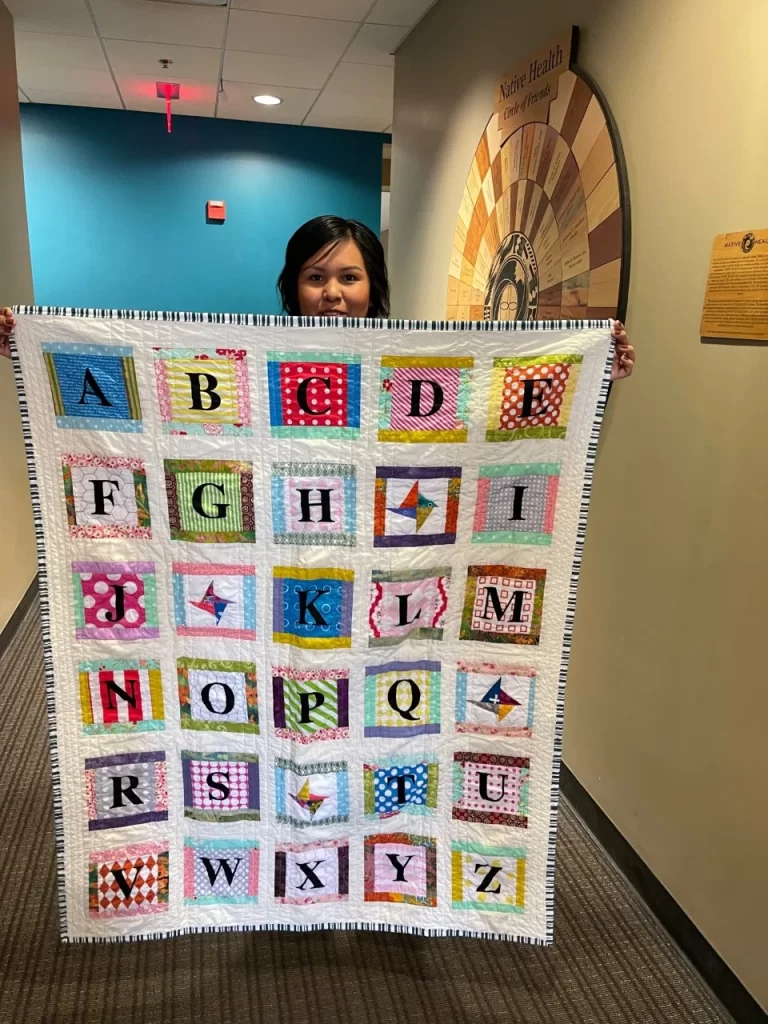Dakota Access Pipeline
Donated quilts for Native families provide kinship
Kalle Benallie
ICT

December’s quilt entitled:”Full of Color Stripes.” Photo courtesy of Native Health)
“There’s a strong comfort in a quilt,” says 69-year-old Debbie Hamilton.
It has a long lasting value where even if there’s a hole it can be repaired and used for years and years.
“They connect you with the past and it’s something tangible that people can do for one thing. The people that are making them feel like they’re helping. People that lost something can hold it, touch it, wrap themselves in it and feel a hug,” she said.
Hamilton’s quilts have given dozens of hugs.
Since 2016, Hamilton has donated 124 quilts to a Native program based in Phoenix that provides services for Native families living away from their tribal lands, specifically pregnant families and children age 5 and younger.
The free program is part of Native Health, a health care and social service provider dedicated to serving Native people in the Phoenix area. It’s called Native Health’s Home Visiting Program.
Hamilton’s niece works for Native Health and she asked if they would accept donations of her quilts since her inventory was stacking up. She treats quilting as a hobby and rarely sells them.
Rasheena McCabe, Navajo, is a home visitor at Native Health. She visits a family in person or on Zoom for educational parent child activities focused on child development, family well-being, physical health activities, mental health as well as providing resources.
She said the quilt builds a cultural connection that starts early on in a child’s life where it can grow alongside the family and child.
“They don’t know that they’re getting a quilt so it’s kind of a surprise for them when they get a quilt at the end of the visit,” she said. “Usually the family is very impressed with the quilt.”
McCabe has been with the program for two years and has provided a quilt to her caseload of 16 families.
Orenda Hill, Oneida Nation, has been with Native Health for over a decade and newly oversees the Home Visiting Program, said the program is a prevention program such as child abuse prevention.
“It’s important as Native Americans, I think, because there has been so much trauma in our families and such disruption in families so we’re trying to instill cultural values back into families that may not be connected as much, trying to promote identity,” she said.

Hill added Hamilton’s familial connection to Native Health is significant considering the families they work with are raising their children in urban areas away from their tribal communities.
“It establishes those kinship ties which are important to Native Americans,” she said.
LaRee Emerson, Navajo, is another home visitor who said the children are always excited to see the quilt by hugging it and wrapping it around themselves.
“I think her designs are pretty unique. I have never seen a blanket that’s identical. They’re all unique in their own way,” she said. “We pretty much look forward to seeing what the next quilt will be. ”
She said giving the quilt to a family reminds her of her grandma giving her a quilt. It’s something that she cherishes and can see it be something that others can appreciate.
“My grandma that I got the quilt from, she’s no longer with us so just having that as a precious thing I think they’ll value it in the long run,” Emerson said. “There will always be a story behind the quilt.”
Hamilton, who is not Native, learned how to sew from her grandmother and started quilting after seeing her sister making a quilt.
“I kind of left it for years and years and years. Then I picked it up again and I made a few with a very, very old sewing machine,” she said.
She eventually got a new machine and has a lot of free time from being retired as a technology project manager from AT&T.
Hamilton estimates that each quilt she donates costs a minimum $200 which doesn’t count the time to make it. She said it takes a couple of weeks to complete depending on the design.
She mostly takes inspiration from the fabric and also looks at quilting accounts on Instagram. She said she likes a lot of bright colors in her designs.
She sews every day and makes them months in advance. She hopes to make 200 quilts and then she’ll decide to continue.
But the reactions she gets from the families who receive them make it worthwhile.
“It just warms my heart knowing that somebody has it and enjoys it and it makes them happy. That’s why I keep doing it,” she said.
External
After some reworking, law enforcement backs newest alert system
"Our people are worth it": NCAI panel confronts epidemic of violence, long road ahead and need for unity
Reporting Excellence
Tribal elders enjoy an afternoon of games, prizes and food on the Fort Berthold Reservation
Carmen O’Leary fights to help Indigenous survivors of violence amid budget cuts






